From Sea to Plate: Understanding the Importance of Traceability in Sushi
In this article, we will explore the importance of traceability in sushi and how it affects both consumers and the industry as a whole.
What is Traceability?
Traceability refers to the ability to track and trace the movement of products and ingredients throughout the supply chain. In the context of sushi, traceability involves knowing the origins of the fish, the fishing method used, the transportation process, and the handling at every step of the supply chain. This information is crucial for various reasons, including quality control, food safety, sustainability, and consumer confidence.
Quality Control and Food Safety
Traceability in sushi ensures that the fish used in the preparation is of high quality and safe for consumption. Knowing the origin of the fish enables sushi chefs and restaurant owners to choose suppliers that follow strict quality standards. Additionally, traceability allows for quick identification and recall of products in case of contamination or other issues, preventing potential health risks for consumers.
Key Takeaway: Traceability ensures the quality and safety of sushi by enabling the identification of the origin of fish and quick recall processes in case of any issues.
Sustainability and Environmental Impact
The demand for sushi has put considerable strain on fish populations, leading to overfishing and depletion of certain species. Traceability plays a crucial role in promoting sustainability in the sushi industry. By tracing the origins of the fish, it becomes easier to identify and choose sustainable fishing practices. This helps in preventing the collapse of fish stocks, protecting the marine ecosystem, and supporting the long-term viability of the industry.
Key Takeaway: Traceability allows the sushi industry to choose sustainable fishing practices, protecting the environment and ensuring the availability of fish for future generations.
Consumer Confidence and Transparency
Traceability provides transparency to consumers, allowing them to make informed choices about the sushi they consume. With growing concerns about food fraud and mislabeling, traceability ensures that the sushi being served is what it claims to be. By providing information about the fish’s origin, species, and fishing method, restaurants can build trust and establish a loyal customer base.
Key Takeaway: Traceability builds consumer trust by providing transparent information about the origin and authenticity of the fish used in sushi.
Industry Regulations and Standards
Recognizing the importance of traceability, many countries have implemented regulations and standards that require sushi suppliers to maintain accurate records of their products’ journey. These regulations help prevent fraudulent practices, protect consumer health, and promote fair and ethical practices in the industry. Compliance with traceability standards also allows sushi businesses to gain certifications, enhancing their reputation and marketability.
Key Takeaway: Traceability regulations and standards ensure ethical practices, protect consumer health, and enhance the reputation of sushi businesses.
The Future of Traceability in Sushi
As consumers become more conscious about the origin and quality of their food, the demand for traceability in sushi is expected to increase. Advanced technologies, such as blockchain and RFID (Radio Frequency Identification), are being explored to further enhance traceability in the industry. These technologies would provide real-time information about the fish, enabling consumers to track the entire journey of their sushi, from the sea to their plate.
Key Takeaway: The future of traceability in sushi lies in emerging technologies that enable real-time tracking of fish, giving consumers complete transparency and trust in the supply chain.
The Bottom Line
Traceability plays a crucial role in maintaining the quality, safety, and sustainability of sushi. By understanding the importance of traceability, consumers can make informed choices, support sustainable practices, and enjoy sushi with peace of mind. Additionally, traceability regulations and advanced technologies will continue to shape the future of the sushi industry, ensuring transparency and trust from sea to plate.
Harmonizing Taste and Conservation: The Delicate Balance of Sushi
In this article, we delve into the delicate balance of sushi, exploring the measures being taken to harmonize taste and conservation.
The Ecological Footprint of Sushi
As one of the most consumed seafood dishes globally, the production of sushi has significant ecological implications. Consider the following statistics:
- According to the Food and Agriculture Organization of the United Nations (FAO), over 33% of global fish stocks are currently overfished.
- Approximately 70% of the world’s fish stocks are fully exploited or depleted, posing a severe threat to marine ecosystems.
These alarming facts highlight the urgency to adopt sustainable practices within the sushi industry, ensuring the preservation of marine life for future generations.
Embracing Sustainable Sourcing
Recognizing the importance of sustainability, many sushi restaurants and suppliers have started implementing measures to source their ingredients responsibly. Here are some key initiatives:
- Adhering to sustainable fishing practices: Establishments are increasingly partnering with suppliers who follow sustainable fishing practices, such as avoiding fishing in vulnerable areas or using destructive fishing methods.
- Supporting responsible aquaculture: Some sushi restaurants source their fish from responsible aquaculture operations that prioritize animal welfare, reduce environmental impacts, and avoid the use of antibiotics or hormones.
- Choosing certified seafood: Labels like the Marine Stewardship Council (MSC) and Aquaculture Stewardship Council (ASC) provide assurance that the seafood is sustainably sourced and managed. Many sushi establishments are opting for certified products to promote sustainability.
By embracing these sustainable sourcing practices, the sushi industry can play a significant role in conserving marine environments and ensuring the long-term viability of seafood resources.
Innovations on the Plate
Advancements in technology and culinary techniques have also paved the way for innovative sushi creations that promote sustainability. Here are some examples:
- Plant-based sushi alternatives: With the rise of plant-based diets, sushi restaurants are experimenting with alternatives to traditional fish-based sushi. By incorporating ingredients like tofu, mushrooms, or even fruits, they offer a sustainable and delicious option for conscious consumers.
- Use of invasive species: In some regions, invasive species like lionfish and Asian carp pose a threat to local ecosystems. Some sushi chefs are turning this ecological challenge into an opportunity by featuring invasive species in their dishes, helping control their populations while offering unique flavor combinations.
- Utilizing bycatch: Bycatch, the unintentional capture of non-target species during fishing, often leads to the wasteful discarding of valuable marine life. However, sushi chefs are utilizing certain fish species caught as bycatch creatively, leading to lesser wastage and increased utilization of available resources.
These innovative approaches not only present exciting new flavors but also contribute to the reduction of our ecological footprint.
Key Takeaways
As sushi continues to captivate food enthusiasts worldwide, it is crucial to strike a balance between taste and conservation. Here are the key takeaways from this article:
- Sushi’s popularity has put significant pressure on marine ecosystems, leading to overfishing and depletion of fish stocks.
- Sustainable sourcing practices, such as responsible aquaculture and certified seafood, are essential in ensuring the long-term viability of sushi ingredients.
- Innovative sushi creations, including plant-based alternatives, invasive species utilization, and bycatch utilization, provide sustainable and delectable options.
By embracing sustainable practices, the sushi industry can contribute to conserving our oceans and maintaining the delicate balance between culinary delight and the well-being of marine ecosystems.
Nurturing Biodiversity Sushi Chefs Advocating for Marine Conservation
By promoting sustainable fishing practices and responsible sourcing, these chefs are playing a crucial role in nurturing biodiversity and protecting our oceans.
The Role of Sushi Chefs
Sushi chefs have long been regarded as culinary artists, mastering the art of preparing and presenting raw fish and other seafood delicacies. But recently, many sushi chefs have recognized the need to go beyond their traditional role and become stewards of the oceans. By using their influence and expertise, they have the power to drive change in the fishing industry and contribute to the preservation of marine ecosystems.
Here are some key ways in which sushi chefs are advocating for marine conservation:
- Sustainable Sourcing: Sushi chefs are increasingly emphasizing the importance of responsibly sourcing fish and seafood. They seek out suppliers who follow sustainable fishing practices, ensuring that the species they use are not overexploited or caught using destructive methods.
- Educating Diners: Through their menus, sushi chefs have the unique opportunity to educate their customers about the importance of choosing sustainable seafood options. By highlighting the species they use and explaining the environmental impacts of certain choices, they can encourage diners to make informed decisions.
- Collaboration: Many sushi chefs are joining forces with marine conservation organizations to support their initiatives. They organize fundraisers, participate in awareness campaigns, and collaborate on research projects to further the cause of marine conservation.
Benefits of Marine Conservation
The efforts of sushi chefs and the broader marine conservation movement have far-reaching benefits. Protecting marine biodiversity and promoting sustainable fishing practices have a positive impact on both the environment and the economy.
Some of the key benefits include:
- Ecosystem Resilience: Preserving marine biodiversity ensures the resilience of ecosystems. Each species plays a vital role in maintaining a balanced and healthy ecosystem, contributing to its overall stability.
- Economic Opportunities: Sustainable fishing practices can create long-term economic opportunities for coastal communities. By maintaining healthy fish populations, we can support sustainable fisheries and secure livelihoods for fishermen.
- Tourism and Recreation: Healthy marine environments attract tourists and provide opportunities for recreational activities such as snorkeling, diving, and fishing. A thriving marine ecosystem translates into a vibrant and sustainable tourism industry.
Key Takeaways
The involvement of sushi chefs in marine conservation is a positive development for both the culinary world and the environment. By promoting sustainable sourcing and educating diners, they are fostering a greater appreciation for marine biodiversity and encouraging responsible consumption.
Here are the key takeaways:
- Sushi chefs are becoming advocates for marine conservation by promoting sustainable sourcing and responsible fishing practices.
- Through their menus, sushi chefs educate diners about the importance of sustainable seafood choices.
- Collaboration between sushi chefs and marine conservation organizations strengthens efforts to protect marine biodiversity.
- Marine conservation benefits ecosystems, economies, and tourism industries.
The role of sushi chefs in advocating for marine conservation is an inspiring example of how individuals can make a significant impact. By prioritizing sustainability in their culinary creations, they are not only satisfying the palates of their customers but also contributing to the preservation of our oceans and the diverse species that call it home.
Sustainable Sourcing: A Key Principle of Sushi Philosophy
One such industry that has embraced sustainability as a key principle is the world of sushi. Sushi chefs and restaurant owners have recognized the importance of sustainable sourcing in their culinary creations, aligning their practices with the traditional principles of this beloved Japanese cuisine.
So, what exactly is sustainable sourcing in the context of sushi? It refers to the ethical and responsible procurement of fish and seafood, ensuring that they are caught or farmed in a way that preserves the overall health and biodiversity of the ocean. By sourcing their ingredients sustainably, sushi restaurants aim to minimize their ecological footprint and support the long-term viability of marine ecosystems.
The Benefits of Sustainable Sourcing
Sustainable sourcing in the sushi industry brings forth a multitude of benefits, both to the environment and to consumers. Let’s explore some of the key advantages:
- Preserving Marine Biodiversity: Sustainable sourcing practices help protect the delicate balance of marine ecosystems by avoiding the depletion of certain fish species.
- Reducing Overfishing: Overfishing has become a global concern, leading to the decline of many fish populations. By sourcing sustainably, sushi restaurants play a vital role in preventing further overfishing and allowing fish stocks to recover.
- Ensuring High-Quality Ingredients: By prioritizing sustainable sourcing, sushi chefs are more likely to use higher quality ingredients. This adds to the overall taste and dining experience.
- Cultivating Consumer Trust: As sustainability gains prominence in society, consumers appreciate businesses that prioritize ethical practices. Sushi restaurants that embrace sustainable sourcing establish trust with their patrons, attracting a loyal customer base.
The Role of Certification
Several certifications and organizations play a vital role in promoting sustainable sourcing within the sushi industry. They provide guidelines and standards that restaurants and suppliers can follow to ensure their practices are environmentally responsible. Some of the key certifications include:
- Marine Stewardship Council (MSC): MSC certification ensures that the fish and seafood were sourced sustainably, guaranteeing that they come from fisheries that operate responsibly and maintain healthy fish populations.
- Aquaculture Stewardship Council (ASC): ASC certification focuses on farmed seafood, ensuring that the fish are raised in a manner that minimizes environmental impact and protects biodiversity.
- Friend of the Sea (FOS): The FOS certification ensures that seafood products come from responsibly managed fisheries that comply with sustainable fishing practices.
Key Takeaways
Sustainable sourcing has become a fundamental principle in the sushi industry. Through ethical procurement and responsible fishing practices, sushi restaurants are striving to protect the environment while delivering delightful culinary experiences to their customers. By choosing sustainably sourced sushi, consumers can actively contribute to the preservation of marine biodiversity and support businesses that prioritize sustainability.
Remember, sustainability is not just limited to the sushi industry. It is a mindset that can be adopted by individuals and businesses in various sectors. By making conscious choices and supporting sustainable practices, we can all be part of a collective effort towards a greener and more sustainable future.


